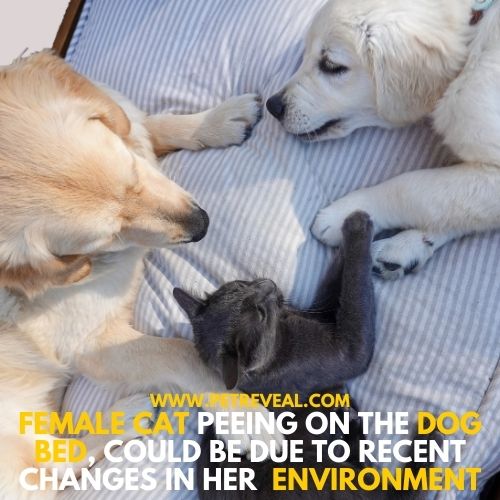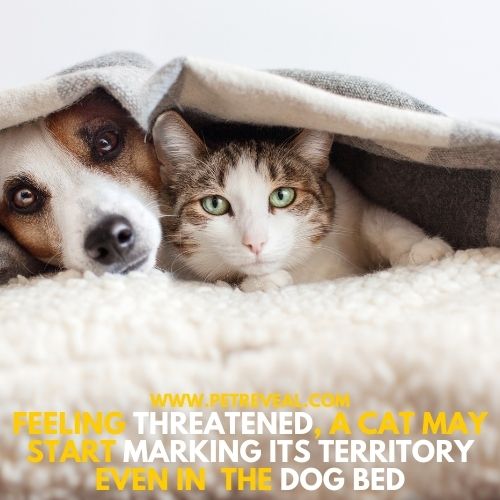Are you puzzled by your female cat’s unusual behavior of peeing on the dog bed? This frustrating issue can be a cause of concern for many pet owners. Understanding why your cat exhibits this behavior is crucial to finding a solution.
We’ll explore seven reasons why your female cat may be peeing on the dog bed and provide insights into how you can address this issue effectively.
Jump to a Specific Section
Seven Probable Reasons for Female Cat Peeing in Dog Bed
From territory marking and dominance issues to stress and anxiety, there could be various factors at play. There can also be medical issues, litter box preferences, changes in routine or environment, behavioral problems, and the introduction of a new pet can all contribute to this unexpected behavior.

So, if you’re eager to uncover the truth behind your feline friend’s actions, keep reading to discover the root cause of this peculiar behavior.
Territory and Dominance
If your female cat is peeing on the dog bed, it could be due to issues related to territory and dominance.
Cats are territorial animals, and they mark their territory by urinating. When a cat feels threatened or insecure, it may start marking its territory in different areas, including the dog bed.

This behavior is often seen when there are changes in the household, such as introducing a new pet or some new family member.
Cats may also exhibit dominance by urinating on objects that belong to other pets, like the dog bed. It’s important to address these territorial and dominance issues by providing a safe and secure environment for your cat, offering separate resources for each pet, and providing plenty of vertical spaces for your cat to claim as her own.
Stress and Anxiety
When faced with changes in their environment or feeling threatened, female cats may exhibit stress and anxiety, which can lead to inappropriate urination, even in the dog bed.
Cats are sensitive creatures, and any disturbance to their routine or surroundings can cause them to become stressed.
Common triggers for stress and anxiety in cats include moving to a new home, introducing a new pet or family member, loud noises, or changes in their daily routine.

These situations can make a cat feel threatened or overwhelmed, leading them to mark their territory by urinating on objects like the dog bed.
It’s important to identify and address the probable reason for your cat’s stress to prevent inappropriate urination and promote their overall well-being.
Medical Issues
Female cats may also pee on the dog bed due to underlying medical issues. It’s important to consider that frequent urination or inappropriate elimination can indicate a health problem in your cat.
One common medical issue that can cause this behavior is a urinary tract infection (UTI). UTIs can cause discomfort and pain while urinating, leading your cat to associate the litter box with pain and avoid it altogether.

Another possible medical condition is feline lower urinary tract disease (FLUTD), which includes a variety of urinary tract disorders such as bladder stones, bladder inflammation, or even blockages. These conditions can cause increased urgency and frequency of urination.
If you suspect a medical issue, it’s crucial to consult your veterinarian for a proper diagnosis and treatment.
Litter Box Preferences
When addressing your female cat’s inappropriate peeing on the dog bed consider her litter box preference. Cats can be very particular about their toileting habits, and if the litter box doesn’t meet their standards, they may look for alternative places to relieve themselves.
First, check the cleanliness of the litter box. Cats prefer a clean and odor-free environment, scoop the litter box daily and change the litter regularly.

Moreover, consider the type of litter you’re using. Some cats have specific preferences for clumping or non-clumping litter, scented or unscented, or even the texture of the litter. Take time to find your cat’s favorite litter.
Finally, observe the location of the litter box. Cats prefer privacy and may avoid using a litter box present in a high-traffic area or near their food and water bowls.
Changes in Routine or Environment
If your female cat is peeing on the dog bed, it could be due to recent changes in her routine or environment. Cats are creatures of habit, and disturbance in their established routines can cause stress and anxiety. Moving to a new house, introducing a new pet, or even rearranging furniture can be enough to trigger this behavior.

Cats rely on familiarity and security in their surroundings, sudden changes can lead to confusion and discomfort. To address this issue, try to maintain a consistent routine for your cat and provide her with a safe and quiet space where she can retreat and feel secure.
In addition, consider using pheromone diffusers or calming aids to help alleviate any anxiety she may be experiencing due to the changes in her environment.
Behavioral Issues
When dealing with a cat peeing on the dog bed, it’s important to address behavioral issues that might contribute to this behavior. Cats are known for their fussy nature, and any change in their behavior can indicate an underlying problem.
One possible behavioral issue could be stress or anxiety. Cats can become stressed due to changes in their environment, and start peeing on dog beds.

Another behavioral issue that could lead to inappropriate urination is territorial marking. Cats may mark their territory to assert dominance or communicate with other animals.
Furthermore, medical issues, like urinary tract infections or bladder stones, can also cause a cat to urinate outside the litter box. It’s crucial to consult a veterinarian to rule out any medical conditions and address possible behavioral issues appropriately.
Introducing a New Pet
To successfully introduce a new pet to your female cat, you should take steps gradually and provide a safe and comfortable environment.
Start by keeping the new pet in a separate room, to adjust with their surroundings.
Swap bedding or toys between the two animals to help them get accustomed to each other’s scent.

Gradually introduce them to each other’s presence using a baby gate or a cracked door, allowing them to see and smell each other without direct contact.
If they show signs of aggression or stress, separate them and try again later.
You can increase supervised interactions as they become more comfortable with each other.
Personal Anecdotes of Cat Owners
Some personal anecdotes provide insight into the challenges faced by cat owners dealing with inappropriate urination behavior and highlight the importance of understanding the underlying causes and implementing appropriate solutions.
- Sarah’s Experience: “When my cat, Muffin, started using the dog bed as her toilet, I was frustrated and confused. After some research, I discovered that she was stressed due to a recent move. I created a cozy sanctuary for her with her favorite toys and blankets away from the commotion, and slowly, she stopped the behavior. It was a relief to see her back to using her litter box.”
- Mark’s Experience: “Dealing with my cat, Whiskers, peeing on the dog bed was a nightmare. I tried everything from changing litter types to cleaning the area meticulously, but nothing worked. It wasn’t until I consulted with a vet that I realized she had an underlying urinary tract infection. With proper medication and diet, Whiskers recovered, and the accidents stopped. It was a tough journey, but I’m grateful for the veterinary guidance.”
- Emily’s Experience: “When I adopted my cat, Luna, I never expected her to be so territorial. She would often pee on the dog bed whenever she felt threatened, especially after I brought home a new kitten. To help her adjust, I introduced them slowly and provided plenty of vertical space for Luna to claim as her own. With time and patience, she stopped marking her territory, and now all my pets get along harmoniously.”
Reddit Community Suggestions
The Reddit community suggests various reasons for a cat peeing on a dog bed. Some advise checking for a urinary tract infection (UTI) or urinary crystals, recommending a vet visit. Others emphasize cleaning the area thoroughly to remove lingering smells that might attract the cat back to the same spot.
One user shared an experience where their cat peed on the dog bed due to a bladder infection. They recommended using a plastic bag to collect a urine sample for the vet. Another user humorously suggested getting rid of the dog, signed “the cat.”
Another user suggested that the cat might indicate something, like a dirty litter box, especially if the behavior occurs while the owner is watching. However, a cat owner clarified that their cat, Zoë, is 10 years old, in good health, and didn’t show other abnormal behavior. Zoë only started this behavior earlier in the year, despite the owner’s travel and having cat sitters.
Overall, the community advises checking for medical issues, ensuring cleanliness, and considering any changes in the cat’s environment or routine that might be causing stress or discomfort.
The Final View
The eccentric behavior of your cat can have several underlying factors. It could be due to territorial or dominance issues, stress or anxiety, medical problems, litter box preferences, changes in routine or environment, behavioral issues, or introducing a new pet. It’s important to identify the underlying cause and address it accordingly to prevent further incidents.
References:
https://www.ncbi.nlm.nih.gov/pmc/articles/PMC6826873
https://journals.sagepub.com/doi/pdf/10.1177/1098612X19880435
https://indoorpet.osu.edu/sites/indoorpet/files/assets/documents/hospital/indoorcat/hostutler05.pdf